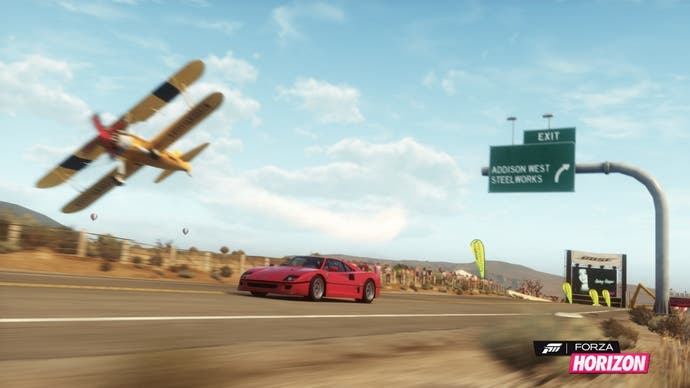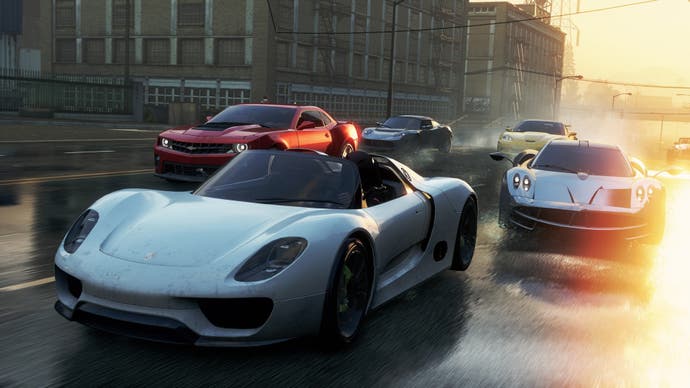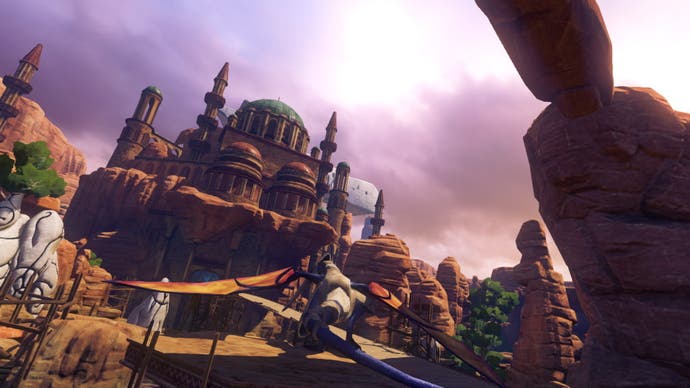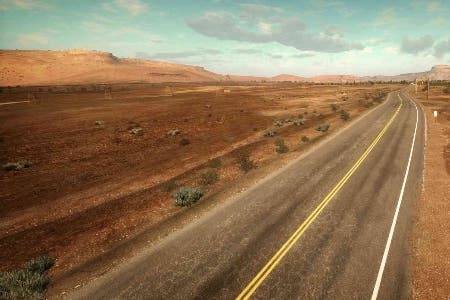Back on track: the UK racing scene revival
How UK's racing talent rose from the ashes.
Motor racing, despite its roots in France, its scarlet red Italian heart and its current domination at the top tier by a German and a Spaniard, is a very British affair. In the heart of England, amidst the pockets of nondescript countryside of Banbury, Oxford and Woking there's the self-titled Motorsport Valley, where a large part of the global circus that's F1 calls home.
Racing games, while they're in part defined by the rivalry between a long-running Japanese series and its US rival, are also a very British affair. It's a connection that runs all the way back to Geoff Crammond's Revs, spiralling out to Codemasters, Criterion and countless other studios that form the UK racing development community.
In contrast to the clinical perfection of Gran Turismo and Forza, British racing games have typically been more upbeat, and more boisterous. They've been about the crash-happy action of Burnout or the pin-sharp acrobatics of Project Gotham - they've been about the fantasy of Blur or the violence of Split/Second.
And they've become an endangered species. When Bizarre's Blur and Black Rock's Split/Second released in the spring of 2010 it felt like electric proof of the talent within the UK scene - but within 12 months, both studios were shuttered, and two of the brightest lights were cruelly snuffed out. The race, it seems, had been run.
What caused the genre to flat-line? "I think it's because single activity games went out of fashion a little bit," believes Jason Avent, a former Black Rock employee. "Things like flight sims - people don't really make them anymore, and things like beat 'em-ups, other than Street Fighter, it's difficult to launch a new fighting franchise.
"People want things that are more like GTA or even Call of Duty - one minute you're in the back of a helicopter then you're running along and then you're in a tank or a car. You do lots of different things, whereas racing games are predicated on the idea that you're racing around the track in a single car, and as soon as you get out of the car it changes the genre a little bit. Those single activity games are going out of fashion, but there were still lots of them. There were really too many games coming out for the size of the audience."
Both Blur and Split/Second were perfect cases in point; both new racing IPs, the pair released within a week of each other, and were both overshadowed by the arrival of Rockstar's Red Dead Redemption. What should have been a crowning moment for the genre ended up sowing the seeds for the downfall for two of its most revered studios.
It was more than just bad timing that saw off Black Rock and Bizarre, though - people had fallen out of love with arcade racers long before the release of Blur and Split/Second.
Neil Thompson, a developer whose experience takes in both Sony's Liverpool Studio and Bizarre before he took his current tenure at BioWare Edmonton, understandably defends Blur, though he's got his own theories as to its failings. "It harks back to when games were just fun," he says of the game's appeal. "They didn't have to be cool. It's got no link to the problems of the day in terms of military terrorism and all that. It's just a fun game. You know like Galaxians was a fun game? You just play it and then you forget about it. Blur was that. You go back and you play it now, it's fun."
"There used to be lots of racing games and now it's distilled down to the big ones, the Need for Speeds, the Forzas and the Gran Turismos. It's not always the case but it seems to be. Are those kind of racing games just not relevant any more? Possibly." - Neil Thompson

"But the problem is, who wants to drive a Ford Focus in a game? I want to drive a Ferrari. If that game had been all Ferraris and Porches and Lamborghinis it would have been a different story. Also, it launched at the same time as Split/Second, and look what happened to them…"
Fun, clearly, isn't enough, and the racing genre's been violently superseded by other types of games this past generation. "What's really taken off in a big way is first person shooters," explains Codemasters' Clive Moody, a veteran of the studio since the Race Driver games who's now working on next year's Grid 2.
"If you look at the relative sizes, percentage wise, 12 years ago to where they are now, they were much closer. Racing games were a much higher percentage, and first person shooters weren't were they are now, but we've seen a much bigger rise in terms of first person shooters. Obviously a lot of that's down to Call of Duty, and things like that. Racing gamers today are just as likely to play FPSs, and we're battling for their hearts and minds."
Neil Thompson agrees. "It just seems there's a never-ending appetite for killing people. That's what people want to do it seems. They want to shoot people. I wonder whether the games we play are a reflection of the social issues we're dealing with.
"You look at a game like Call of Duty and the famous scene in the airport, why has that game gone so ballistic? And then you watch the news and it's an interactive reflection of current events. People are plugged into that in a way that in a racing game you're not because it's not current, so it's always going to be niche. When games hit those pillars of cultural relevance they tend to be successful.
"There used to be lots of racing games and now it's distilled down to the big ones, the Need for Speeds, the Forzas and the Gran Turismos. It's not always the case but it seems to be. Are those kind of racing games just not relevant any more? Possibly."
But there's hope. Developers have fallen by the wayside, including most recently the brilliantly talented team at Sony's Liverpool Studio, but something almost inexplicable has happened. Need for Speed, the series whose roots lie in the all-American thrill of the open road, and Forza, the video game equivalent of the dry auto-appreciation of Road and Track, have become through chance and circumstance British games. It happened first through Criterion's reboot and revival of Need for Speed in Hot Pursuit, and it's happened once again with the upstart developer Playground's open world interpretation of Turn 10's formula with Forza Horizon.

"We set up at a time when there was nothing but doom and gloom," says Ralph Fulton, a key figure at Codemaster's Racing studio before he moved elsewhere in Leamington Spa to help form Playground Games. "Split/Second and Blur hadn't done so well, and that led to where it led to. There are these great racing studios - and it kind of represents where the racing market is.
"You can't have dozens of quite focused or quite niche titles appealing to a very small number of people, whether that's focusing on a very pure racing discipline or focusing on cars with weapons. We've seen this across all genres - everything comes together, and people want to buy into a brand that they know will deliver the things they want to do and the quality that they expect."
Criterion and Playground have the brands, but they've managed to subvert them, instilling them with a sense of playfulness that makes them unquestionable products of the British racing scene. Criterion's Hot Pursuit wears its heritage on its sleeve, while the follow-up Most Wanted feels every bit a gritty reboot of Burnout Paradise. Forza Horizon, meanwhile, feels like a close cousin to the kind of compulsive racing action that made Project Gotham Racing 4 a genre classic.
"Well, to be really glib about it maybe it's because we've got so many people who've come from so many different places," Fulton says of Horizon's similarities to the likes of Project Gotham. "I openly say that our skill system - well, just think of Kudos. I'm not saying we've done anything innovative, as that system was great. All we've done is go deeper with it.
"Yeah, it's great people coming to our studio with different experiences of development, and again - I love that we now have this game that's ours, and can be our calling card so we don't have to justify ourselves by way of our CVs anymore."
Coming off the back of the much-loved Burnout series, Criterion never had to justify itself. It did, however, had to revive a series that had been mired with mediocrity, and it did such a fine job that it now finds itself in charge of the franchise.
"There's not that many that are doing things differently," Criterion's Matt Webster says of the studio's approach to Need for Speed. "And I think that's the key point - you have to take the opportunity to change things up. We've got our hands on the rudder, and we're steering its direction. It's where we think it needs to go - where it ends up going, that's a long path that we're going on. How that gets translated to a strategy, that's something that continues to be defined."
There's a thread that runs through the big racing games that have emerged from the revived UK racing scene, though - they're all tied to big licences, and to big, existing brands. So is that the price of entry for a racing game in this day and age?
Criterion's Hamish Young isn't so sure. "No, I don't think that's true - but what I do think's true is that the people who buy the games out there are very sophisticated - and their tastes are very sophisticated. So it's hard for someone to rock up day one and get it right. You could kind of do it, but we've been doing this for 12 years, and it takes a long time to get to that kind of nuance and capability, and it's that knowledge that's the issue, not necessarily the brand."
"There's a barrier to entry with the consoles as well, and the level of fidelity and the expectations - that itself is a barrier," chimes in Matt Webster. "If you look at some of the driving games that are here, people will always have a go. It's like any of the genres - to cut through, you need to make a noise."
"I'm not sure if I'd go that far," Playground's Ralph Fulton says on the need for a big licence to survive, "but put it this way - I certainly wouldn't want to be releasing a new racing IP, certainly not at this stage in the generation. Brand recognition counts for a lot more than just the recognition - it's because those brands mean something. In Forza's case it means quality - those guys have an incredible track record of quality, which is daunting for us but that's where the bar is."
"I certainly wouldn't want to be releasing a new racing IP, certainly not at this stage in the generation. Brand recognition counts for a lot more than just the recognition - it's because those brands mean something." - Ralph Fulton

Gareth Wilson, another former Bizarre employee who moved over to Sumo to work on the well-received Sonic & All-Stars Racing Transformed - another racing game tied to a huge licence - is a little more candid.
"I think it is," he says. "Funnily enough, it's something that Activision, when they closed Bizarre - they said that unless you've got an established licence in the racing genre then you're really going to struggle. So you've got Split/Second and Blur - new IPs. If you're going to do a new IP, you've got to do it on a new console."
It could be the case, of course, that the racing genre's future isn't necessarily tied into console. Outside of that space, it's already flourished: Newcastle's Eutechnyx studio is tinkering with the ambitious free-to-play Auto Club Revolution, while London's Slightly Mad, although it's still committed to console, has displayed the virtues of working alongside a dedicated PC audience with its crowd-sourced Project Cars. And perhaps the biggest success story this year has been that of Jason Avent's Boss Alien and CSR, the iOS racer that brought in $12 million in its first month.
"The important innovation is making handling better and better, and right now you've got handling that's like a real car, and you can't really get that any better," says Avent of the genre's future. "I think it's got to the logical conclusion. It's going to be really difficult to innovate in racing - just like it's difficult to innovate in any genre on console. It's really expensive to make console games, so people are quite risk averse."
The future of racing games on console, Avent believes, is as a component in broader experiences such as Watch Dogs - a game that Ubisoft Reflections, racing veterans that in their previous life made Destruction Derby and the Driver series, is currently working on.
Over at Sumo, though, there's a belief that the next generation could see another revival, and a return to the arcade racer's heyday. "Every time a new console comes out you see a Ridge Racer or something like that, and they show what the consoles can do," says Sumo producer Steve Lycett. "They're great technical showcases."
"We've got to a point where we can't make it more visually impressive," Wilson agrees. "The tech guys here have done a wonderful job, but to really push it along… Look at the difference between PGR 2 and PGR 3, where we had the in-car view with the fully working mirrors. We couldn't have done that on an Xbox. And that's what you really need, if you're going to do a sim - a proper 60 frames game with a 120 frames per second physics engine."
"120 frames!" Lycett exclaims in disbelief.
"You can do that," Wilson comes back as he continues to dream. "You could do an awesome version of Daytona on next-gen. Yeah, a proper next-gen Daytona." Could that be a reality? "Yeah, we've talked about that," Lycett says. "We have talked to [Sega] quite a lot, and it's one of those things we've really looked into."
Whether it ever happens or not is another matter altogether, and with the continued success of the Sonic All-Stars series Sumo's future may already be locked in. But with Need for Speed and Forza both having their destinies tied to British studios, the future for the UK racing scene, at long last, seems bright.

